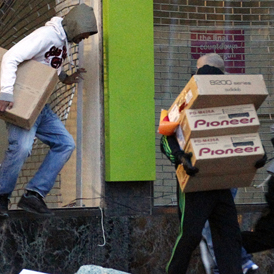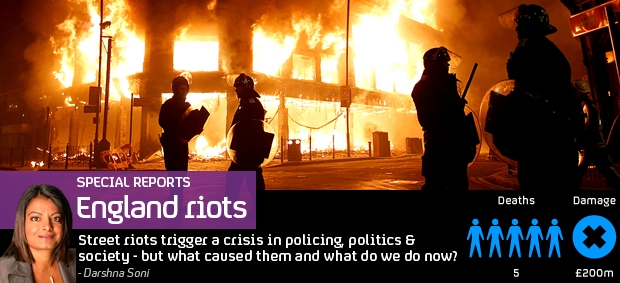Street riots: a crazy week of Britain’s worst and best
 Darshna Soni
Communities Editor
Darshna Soni
Communities Editor
After the riots that shocked England, Channel 4 News Midlands Correspondent Darshna Soni reflects on a “crazy week” and asks was the behaviour really indicative of the breakdown of moral society?

How will we remember the summer of 2011? In one crazy week, I witnessed the very worst of Britain spilling out onto our streets; but also, the very best.
Will the riots be as defining for David Cameron‘s time in office as 9/11 was for Tony Blair, as Iain Duncan-Smith believes? The Government has established an independent panel to examine the causes.
In the meantime, it’s declared “war on gangs”. But were all those involved really in a gang? That’s certainly not what we witnessed in Birmingham. On the first night of looting, we found dozens of stores that had had their entire front windows smashed in.
We filmed very different types of people helping themselves to the merchandise; a group of giggling girls took a few t-shirts; two students went for a couple of phones; a group of young boys in hoodies took pictures of themselves next to a mannequin.

The police were nowhere to be seen. The stores were left unguarded, a temptation that too many could not resist. That’s probably why there have been such surprising individual stories of those charged with theft; teachers, graduates, army cadets.
All sorts of respectable individuals who would never normally dream of stealing, but who were caught up in the “madness of crowds” (A term used back in 1841 by a Scottish journalist, Charles Mackay, who studied mass movements).
Many have been left with a criminal record, some for offences as seemingly trivial as stealing bottles of water. Magistrates across the country held special all-night hearings to deal with the record numbers of cases. The harsh sentences may have acted as a deterrent. But for many months, we will argue whether they were fair.
Store owners whose businesses were ruined may think they were. We interviewed many who had worked hard for years to build family shops, only to see them trashed in hours.
We will also continue to debate what lay behind it all. Was the behaviour really indicative of the breakdown of moral society? A reflection of the disaffection and disconnect many youngsters feel?
The disorder began after a protest in north London after a man was shot by the police in unexplained circumstances.
The complaints many in the local community had about police harassment are the same complaints I heard decades ago, when I worked in Tottenham for the late Bernie Grant MP following the Broadwater Farm riots.
Did the death of Mark Duggan really trigger the violence that spread to other cities? One looter I interview in Wolverhampton told me he was doing it for the man who was killed in London – but admitted he didn’t even know his name.
At times, the atmosphere took on a sinister edge. We filmed the horrific aftermath of the murders of three Asian men in Birmingham. The city was on edge. The authorities feared retaliation attacks, in a city with a history of racial tensions.
That Birmingham pulled back from the brink was attributed in part to one man. Tariq Jahan, the father of one of those killed, whose words inspired so many. A man who came to symbolise all that is good about our country at a time when his son was killed by all that is bad.





